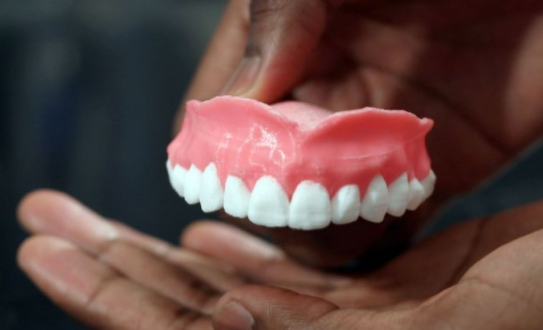The latest 3D printing denture application technology is expected to improve the symptoms of oral inflammation caused by denture infection. After making dentures with 3D printed materials with microcapsule-type anti-inflammatory drugs, it can release anti-mold agents regularly, reduce mold growth, and reduce dentures. It is expected that it will save a lot of time and money for patients, and it will impact on the modeling of traditional time-consuming dentures.
According to the research team at the University of Buffalo, two-thirds of the population of dentures in the United States have long suffered from inflammation and redness caused by mold infections in the dentures. The PhD student Praveen Arany led the team to develop perfusion. 3D printed dentures of anti-mycin B (Amphotericin B) drugs are undoubtedly a gospel for high-risk populations, especially for the elderly, hospitalized patients and people with disabilities.

Comparing current denture cleaning options, such as soaking antibacterial mouthwash, baking soda, or sterilizing in a microwave oven, the research team led by Arany said that the 3D printed dentures filled with anti-inflammatory drugs allow patients to prevent infections without having to take dentures.
The R&D design incorporates an anti-fungal drug into the innovative Acrylamide as a printing material that combines the denture polymer with the microspheres in a 3D printing process via a new syringe pump system. The research team also tested different stratification methods, hoping to have more doses of the dental prosthesis, but finally found that the permeability of the monolayer of the film is better than that of the stratification, which is more effective in inhibiting mold growth.
According to reports, the dental biomaterials market reached more than $66 billion in 2015 and is expected to grow by 14% by 2020. Most of the industry today is focusing on building polymer materials for dentures. The research team believes that acrylamide is At present, the most suitable material for the construction of dentures is not only capable of producing 3D printed dentures, but also maintaining the same strength as conventional dentures, and effectively releasing antifungal drugs.
The research team flexed the dentures through the flexural strength test and performed the tooth strength test to find the break point. It was found that the 3D printed dentures had a flexural strength that was 35% lower than that of the conventionally constructed dentures, but did not break. In terms of drug delivery, the antifungal agent is first placed in the biodegradable and permeable microspheres to prevent the drug from being affected during the high temperature printing process, and finally the drug is simultaneously released during the gradual decomposition of the microspheres.
This technology allows clinicians to quickly model and produce customized dentures at the desk, and can also be applied to other medical materials needed for clinical diagnosis, such as secondary wood, templates, molds and prostheses. The improved tradition may take several days to several weeks to make the denture molding process.
According to Arany, this innovation will save patients time and money, because the anti-mold agents in 3D printed denture materials will be administered regularly. The future research direction of anti-mold 3D printed dentures will use glass fiber and carbon nanotubes to enhance their physical strength, and focus on the replacement of dentures. It is expected that the dentures will be maintained in the most comfortable state after realignment.
USB Sound module for toy,greeting cards,book
There are the Sound module,mp3 sound module,USB Vocal module,Waterproof sound module,recordable sound chip etc for the musical greeting cards,postcards,paper bag,gift box,children toys etc
USB Sound Module, MP3 Sound Chip, MP3 USB Sound Chip,USB Vocal module
AST Industry Co.,LTD , https://www.astsoundchip.com